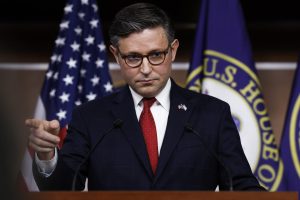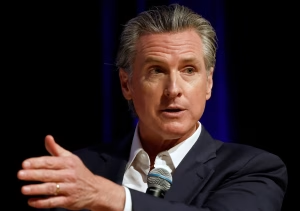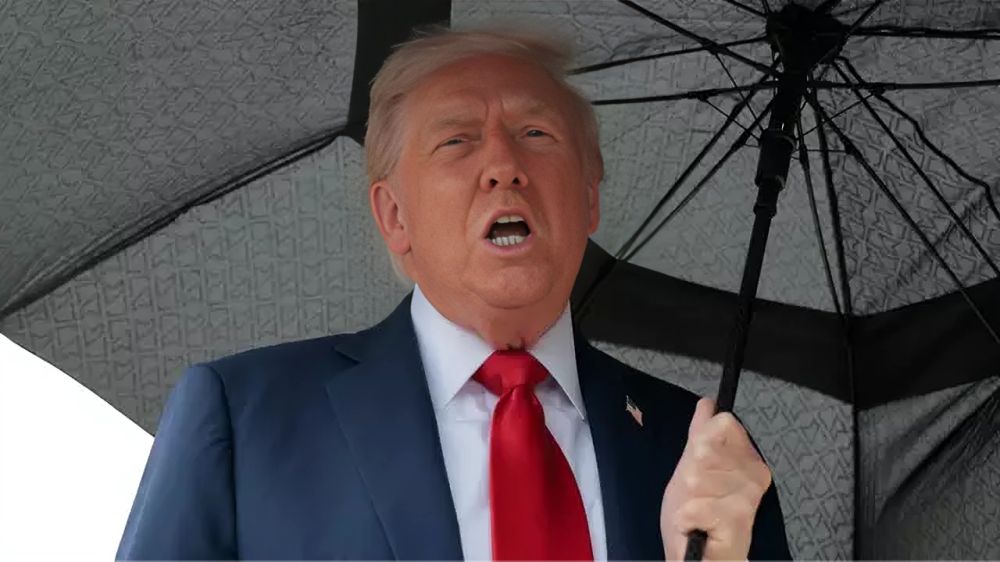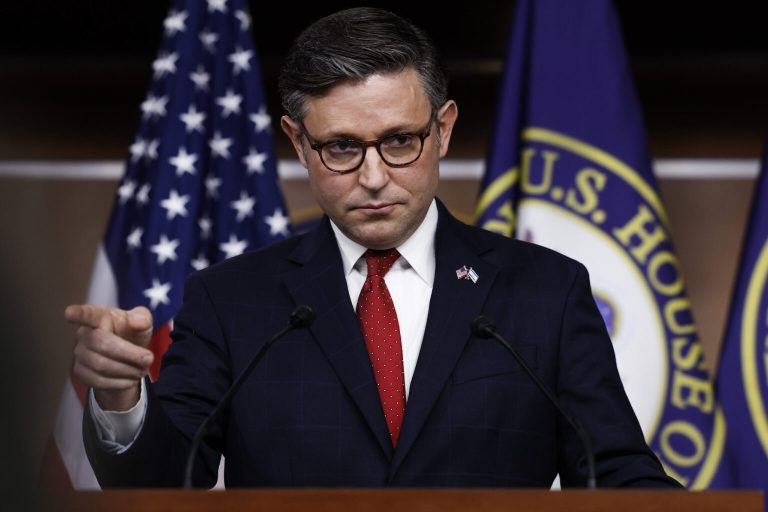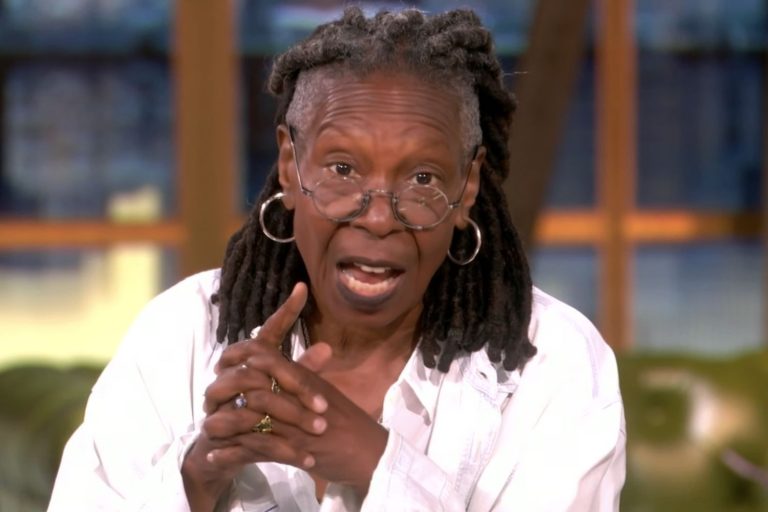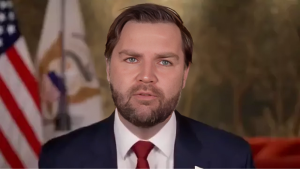President Donald Trump has issued his most direct warning yet to Russia — threatening to send long-range Tomahawk missiles to Ukraine if Vladimir Putin refuses to end the war.
Speaking to reporters aboard Air Force One on Sunday (October 12), Trump signaled that his patience with Moscow is wearing thin. The president, still fuming from being passed over for this year’s Nobel Peace Prize, said he may resort to what he described as a “new step of aggression” to push Russia toward the negotiating table.
“I might say, ‘Look: if this war is not going to get settled, I’m going to send them Tomahawks,’” Trump told journalists traveling with him. “The Tomahawk is an incredible weapon — a very offensive weapon. And honestly, Russia does not need that.”
He added, “If the war is not settled, we may very well [send them]. We may not, but we may do it. I think it’s appropriate to bring up.”
The remarks mark one of Trump’s most overt public threats since returning to office — a significant escalation that could have sweeping geopolitical consequences.
Tomahawks on the Table
Tomahawk cruise missiles are among the U.S. military’s most advanced long-range weapons. Capable of being launched from land, sea, or submarines, they can strike targets with pinpoint precision from over 1,000 miles away.
While the United States has supplied Ukraine with sophisticated defensive systems — including HIMARS rockets and Patriot air defense batteries — the Tomahawk would represent a major shift. Unlike previous systems designed primarily to defend Ukrainian territory, Tomahawks could enable Kyiv to strike deep into Russian territory, including targets around Moscow.
That’s exactly what has the Kremlin worried. Within hours of Trump’s remarks, Russian presidential spokesman Dmitry Peskov warned that even discussing the idea “is of extreme concern.”
“We see this as a highly destabilizing and escalatory step,” Peskov told reporters in Moscow. “It would change the entire nature of the conflict.”
Zelenskyy Responds: “We Work On It”
Trump’s statement appeared to confirm reports that discussions about Tomahawk deliveries have been underway between Washington and Kyiv for several weeks.
When asked about the issue on Fox News’ The Sunday Briefing, Ukrainian President Volodymyr Zelenskyy seemed to corroborate Trump’s comments, though he stopped short of confirming a final decision.
“We work on it,” Zelenskyy said. “I’m waiting for the president to say yes. Of course we count on such decisions, but we will see. We will see.”
The exchange indicates that Kyiv remains cautiously optimistic about securing the weapons — though analysts warn that providing Ukraine with offensive long-range missiles would likely provoke a fierce Russian response.
A Warning to Moscow — and a Message to the World
Trump’s threat came just days after a U.S. court ruling blocked the administration’s attempt to expand its troop deployment authority under the Insurrection Act. Sources close to the White House suggest the president’s remarks were partly intended to project strength following that setback — but they also reflect growing frustration with Putin’s continued offensive operations.
“Do they want to have Tomahawks going in that direction? I don’t think so,” Trump said, implying that the mere threat of the missiles could serve as leverage in peace talks.
“I think I might speak to Russia about that,” he continued. “Tomahawks are a new step of aggression.”
The president then pivoted to his familiar theme of self-promotion, suggesting that his approach to Ukraine could still earn him the international recognition he believes he deserves.
Still Smarting From the Nobel Snub
Earlier in the week, Trump publicly complained about not receiving the Nobel Peace Prize, claiming that he “ended six wars” during his presidency and deserved recognition for his efforts to “restore global stability.”
The Nobel Committee instead awarded the prize to humanitarian organizations working in Gaza and Ukraine. Trump’s allies have characterized the decision as politically motivated, while the president himself has dismissed it as “a rigged, globalist joke.”
Nevertheless, Trump has continued to frame his Ukraine policy as one rooted in peace — albeit peace through strength.
“Putin can look great if he ends this war,” Trump told reporters. “If he doesn’t, it’s not going to be good for him.”
The Kremlin’s Uneasy Response
Russia’s reaction was swift and severe. The Kremlin accused Trump of “dangerous brinkmanship” and warned that any transfer of Tomahawk missiles to Ukraine would be interpreted as direct U.S. involvement in the war.
Russian military analysts on state television described the potential move as “an invitation to disaster,” while nationalist lawmakers urged Putin to respond preemptively.
“Delivering Tomahawks would cross a red line,” said senior lawmaker Leonid Slutsky. “We would have to respond militarily — not just diplomatically.”
Meanwhile, Western defense experts cautioned that Trump’s comments could undermine ongoing diplomatic efforts. “Threatening offensive weapons at this stage risks escalation,” said former NATO commander General Ben Hodges. “It’s a very different message than deterrence — it’s coercion.”
Inside the White House Calculus
Administration officials have tried to downplay the president’s remarks, suggesting that Trump was “speaking broadly” and that no formal policy shift has been enacted.
But aides acknowledge that the president sees Ukraine as both a geopolitical flashpoint and a test of his personal negotiating prowess.
“He’s trying to signal that his patience is running out,” one senior administration source told Politico. “He wants Putin to feel pressure, not just from sanctions, but from the possibility that Ukraine’s capabilities could dramatically expand.”
The source added that Trump believes “threats work better than concessions” — a philosophy consistent with his transactional approach to foreign policy.
Ukraine’s Balancing Act
For Ukraine, Trump’s remarks present both an opportunity and a risk. Kyiv has long sought longer-range weapons to strike Russian logistics hubs and supply routes far beyond the front lines.
However, officials in Zelenskyy’s government are reportedly wary of being drawn into a cycle of escalation that could justify further Russian retaliation.
“Ukraine needs deterrence, not provocation,” said a senior Ukrainian defense adviser speaking anonymously. “If Tomahawks arrive, Russia will claim it’s a direct U.S. attack. That’s a dangerous narrative.”
Still, others see the threat as a vital show of support. “Moscow only respects strength,” said Oleksiy Danilov, Secretary of Ukraine’s National Security Council. “If the U.S. shows weakness, the war continues indefinitely.”
Global Reaction and the Road Ahead
The European Union and NATO have yet to issue formal responses, though several European diplomats expressed concern that Trump’s comments could fracture allied unity.
Germany and France have both emphasized diplomacy over escalation, while Poland and the Baltic states privately support stronger U.S. deterrence measures.
“This could either be a turning point — or a trigger,” said one European diplomat based in Brussels. “If Trump actually sends Tomahawks, Putin will almost certainly retaliate somewhere, perhaps even outside Ukraine.”
For now, Trump appears content to keep his threat ambiguous — a hallmark of his foreign policy style. By leaving Moscow guessing, he hopes to leverage uncertainty into concessions.
Whether that gamble pays off — or ignites a new phase of the war — remains to be seen.

James Jenkins is a celebrated Pulitzer Prize-winning author whose work has reshaped the way readers think about social justice and human rights in America. Raised in Atlanta, Georgia, James grew up in a community that instilled in him both resilience and a strong sense of responsibility toward others. After studying political science and creative writing at Howard University, he worked as a journalist covering civil rights issues before dedicating himself fully to fiction. His novels are known for their sharp, empathetic portraits of marginalized communities and for weaving personal stories with broader political realities. Jenkins’s breakout novel, Shadows of Freedom, won national acclaim for its unflinching look at systemic inequality, while his more recent works explore themes of identity, resilience, and the fight for dignity in the face of oppression. Beyond his novels, James is an active public speaker, lecturing at universities and participating in nonprofit initiatives that support literacy and community empowerment. He believes that storytelling is a way to preserve history and inspire change. When not writing, James enjoys jazz music, mentoring young writers, and traveling with his family to explore cultures and stories around the world.

